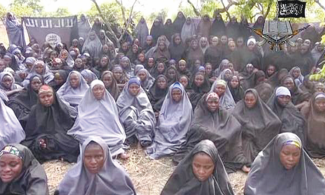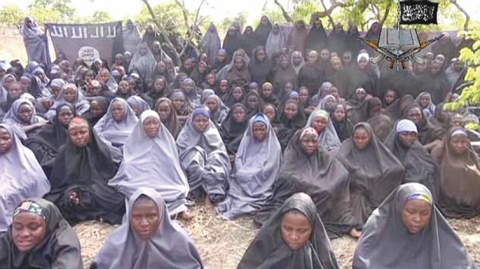
The Nigerian Army ignored courtesy, decency and elementary tact and declared Salkida, Bolori and Wakil wanted, citing the letters of the Terrorism Prevention Act 2011 as authority.
After a 'proof of life' video showing scores of Chibok girls emerged on Sunday, the Nigerian Army took a rash step that is sure to endanger the lives of the hostages: it declared Dubai-based Nigerian journalist Ahmed Salkida, Ahmed U. Bolori, and Aisha Wakil wanted for supposedly hoarding information on the whereabouts of the world's most famous captives.
The Nigerian Army said Salkida, Bolori and Wakil ''have information on the conditions and the exact location of these girls.'' The trio, the army headquarters continued, ''have links with Boko Haram terrorists and have contacts with them. They must therefore come forward and tell us where the group is keeping the Chibok Girls and other abducted persons to enable us rescue them.''
Salkida is well known for his knowledge of the hierarchy and thinking of Boko Haram leadership. He has a better understanding of the makeup of Boko Haram more than any other Nigeria-born journalist. He had tweeted that Boko Haram had sent him the video exclusively before it was uploaded on Youtube.
Bolori, a resident of Maiduguri, the cradle of the 'Islamist' sect, is referenced as the '' coordinator of the Fa’ash Foundation and the Partnership Against Violent Extremism (Pave).''
Wakil is a lawyer and a staffer of the National Human Rights Commission. She was a member of the Committee on Dialogue and Peaceful Resolution of Security Challenges set up by President Goodluck Jonathan in April 2013.
It would be foolish to vouch for innocence of the three. There is no way to determine that they have zero sympathy for Boko Haram. Yet, it is absolutely clear from the army statement that the only reason why they pronounced Salkida, Bolori and Wakil accessories to the crime of terrorism is their rare communication link with Boko Haram. They are not 'guilty' beyond the fact that they know and are known by Boko Haram leaders.
Another thing that begs to be inferred from this development is that the Nigerian Army would not have seen the need to declare the individuals wanted had Boko Haram not published the video. The video jarred the army. It awakened an army that effectively lapsed into relaxation after the resilient vigilante, the civilian JTF, discovered, by chance, Amina Ali, a Chibok girl wandering around the fringes of Sambisa forest earlier in the year.
The video embarrassed the army top brass. They feared that it would remind the Nigerian people that the Nigerian army abandoned the idea of pursuing the rescue of the girls. The generals authorized the manhunt stunt in order to create the impression that they were fully engaged with rescuing the girls all along.
The Nigerian Army has a reputation for being overly defensive of its name and it has a weakness of going to great lengths to curate an image of professionalism even at the expense of professionalism itself.
In this case, the Nigerian Army did not invite any of the three Nigerians ''for interrogation.'' If it was necessary to interview them, prudence requires that it should be done discreetly and quietly. You invite them secretly. You interact with them respectfully. You treat them with dignity.
The Nigerian Army ignored courtesy, decency and elementary tact and declared them wanted, citing the letters of the Terrorism Prevention Act 2011 as authority. It was simply desperate to be seen to have taken an action...even if it was a foolish one!
It's almost needless to say that the public manhunt of the three is an action bereft of common sense. And it holds the potent promise of being counterproductive.
Boko Haram has been keeping the girls as bargaining chips for a while now. Knowing the interest of the international community in the story of the kidnapped girls, the terrorists hold the girls as their capital for negotiation. Now reduced to a rump by military assaults and fractured by an ideological civil war, the Boko Haram camp has a greater incentive to tighten the leash around the girls.
In the video, one of the girls – later identified by her mother as Dorcas Yakubu - is heard speaking her native Kibaku language. She urged Nigerian officials to agree to a swap deal in which they will be granted freedom in exchange for the release of arrested Boko Haram fighters. She apparently echoed the dictation of her captors.
The declaration that Salkida, Bolori and Wakil are wanted will achieve the end of throwing Boko Haram into panic mood. And in that mood, chances are excellent that the psychopaths, famed to be drug addicts, can do the most unreasonable thing: An unreasonable thing that will foreclose the presumed aim of the manhunt, which is the rescue of the girls alive.
The Nigerian Army has an ineffectual intelligence system. It highlighted that strategic deficit by declaring Salkida, Bolori and Wakil wanted for not volunteering information on the ''conditions and exact location of the girls.'' The Nigerian Army exposed itself to ridicule by affirming that it had no prior plan for the rescue of the girls and that it intends to formulate one on the basis of the disposition and testimony of three Nigerian civilians!
Here's a riddle to ponder: What would the Nigerian Army do if Salkida, Bolori and Wakil declined to talk? Would the army torture them? Or would the army recommend them for prosecution?
It's a shame that more than two years after Boko Haram terrorists abducted the teenage girls from their school in Chibok, the universe of Nigerian security agencies – comprising the Nigerian Police, the Nigerian military, the Department of State Security, the Nigerian Intelligence Agency – is clueless about the location of the girls. And it's a bigger shame that the Nigerian Army is not aware of the implication to national security of broadcasting to the whole world that Nigeria has a mockery of an intelligence system that lacks the technology and skill to locate hostages in a known forest within the borders of Nigeria!
Boko Haram claimed in the video that the Nigerian Army killed several of the Chibok girls in airstrikes. The Nigerian Army, true to type, denied. But how is the Nigerian Army in a position to know that some of the girls were not consumed by its bombing of Sambisa forest when it admittedly knows nothing about the exact location of the girls?
The Nigerian Army has always insisted on the validity of its single story as far as the war against Boko Haram is concerned. In March 2015, they arrested two Aljazeera journalists, Ahmed Idris and Mustafa Andy, for ''loitering'' in the front lines of Maiduguri. The charge was ridiculous, not the least because it is inconceivable that two sane journalists would consider a theater of war an ideal place for leisurely strolling!
The army accuses Salkida, Bolori and Wakil of helping to disseminate Boko Haram videos. Boko Haram can publish their propaganda videos by other anonymous means. With or without the three, the terrorists can always upload their material on the internet.
The victimization of Salkida, Bolori and Wakil is senseless. They should be valuable contacts for negotiating the release of the girls. Their shaming and harassment will only serve to scare other Nigerians who have a non-criminal relationship with Boko Haram into the closet.
A serving senator, Sani Shehu, is known to have 'links' to Boko Haram leadership. He has confirmed this numerous times. And he often comments about his ability to talk to the highest echelon of Boko Haram. This, alone, does not suffice to make Sani a Boko Haram sympathizer.
The truth is that Boko Haram terrorists are Nigerians. They had normal interpersonal relationships before they defected to terrorism. As villains, they will continue to maintain a degree of relationship with the outside society.
It behooves the Nigerian state to identify those citizens that have credible connection to the terrorists and work with them to secure the release of the girls. Any other method that is not negotiated release is fraught with prohibitive risk.
The army says Salkida, Bolori and Wakil must divulge the exact location of the girls so Nigerian soldiers can take the bearing and rescue the girls. There is no guarantee that the three know that much. The exact location of the girls has to be Boko Haram's most guarded secret. But assuming that they are in the know and that they are ready to reveal same, does the army have any strategy to execute a rescue at no human cost? Or does the army want to rescue the girls dead?
The declaration that Salkida, Bolori and Wakil are wanted will prompt the terrorists to move the girls. And it will increase the preparedness of the terrorists to challenge the invasion of their space. In the event that the army is foolhardy enough to attempt a rescue by martial conquest, the girls will be lost. The terrorists will kill the girls. They cannot allow the Nigerian Army the glory and glee of forcefully rescuing the Chibok girls alive.
This preposterous manhunt was ordered by the Chief of Army Staff, Lt. General Tukur Yusuf Buratai. He is a general of impulse. He unleashed soldiers on Shiites in Zaria and compelled a chain of events that saw 347 people massacred because a civilian procession denied him right of way. It is his impulse that informed this reckless gamble with the lives of Chibok girls.
President Muhammadu Buhari would do well to restrain Buratai. If any tragedy befalls the Chibok girls as a consequence of the wrongheaded manhunt for Salkida, Bolori and Waklida, blood will be on Buhari’s hands. And he won't have luxury of playing a Pontus Pilate. He will have to bear the ultimate responsibility as the incumbent commander in chief of Nigeria.
You can reach Emmanuel at [email protected] and follow him on Twitter @EmmaUgwuTheMan.
